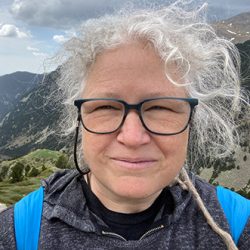T.L. Taylor

Pronouns:
she/her
Title: Professor of Comparative Media Studies
What was your journey to MIT?
I’m from a white working-class family. My father graduated high school and was a machinist then house-painter then janitor/maintenance worker. My mom dropped out as a teenager but went back and finished as an adult after many odds and ends jobs. Though I was a good (if undirected) student when I was young, when I was 12½ my mom died and life kind of went off the rails.
It was only after an older woman I respected told me I should try and “do something with my life” that I ended up seeing what my local community college, Chaffey (in Rancho Cucamonga, California), could offer. I figured I could take a class or two during the day while I worked at night.
I eventually ended up at UCB thanks to the state system of intentionally creating transfer paths for students like myself and keeping it affordable.
It’s hard to trace your trajectory somewhere. It’s too easy to fall into cliché meritocratic myths; to forget your privilege (though raised in a working class household, my whiteness was always a non-trivial part of my opportunities).
Remembering all the small pivots, and missed ones, that make up the whole is an impossible task. The truth is much messier, tangled up with chance and effort and privilege and any other number of variables that simply can’t be pulled apart.
Original post: https://tltaylor.com/2015/08/in-through-the-back-door/
What advice would you give yourself if you were able to go back and speak with the undergraduate version of yourself?
Coming from a working class family I had a pretty narrow view both of what time in college was for and what a professional life could look like after. While I loved my major, sociology, I graduated with little sense of what I could go on to do and be happy with (sometimes I joke that I became an academic because I didn’t really know what else to do other than waitressing!). I’d encourage my younger self to seek help in thinking creatively about what work post-graduation could be and asking for more support to explore opportunities that would otherwise have been off my radar. I sometimes think that while my background set me up to be a hard worker in school, it didn’t prime me to think expansively or creatively about what my life could be. I’d encourage my younger self to plug into programs and communities that let me do more exploration into what life could be.
What advice would you give a current MIT student on navigating all the opportunities available to them at MIT?
It’s probably no surprise that my advice is clearly tied to my own experience. Explore beyond what you envision is needed for employment after you graduate. This is one of the few times in life you can think expansively about your interests, what brings you joy, what work aligns with your values and commitments. The world is big and there are tons of ways you can make a living. Even though you may have real economic issues you are facing, use this time to break out of some of your preconceptions about what your life should be. In tandem to this, MIT is a well-resourced institution filled with lots of folks who want to help you succeed and find an exciting path. Tapping into those resources requires seeking help, asking questions, and chasing down leads – try and be bold in seeking what you need to make the most of your time here and find communities of support so you aren’t alone in that journey.
What is your favorite thing about MIT? The students, without a doubt. It’s one of the hardest working but also most delightful group of folks I’ve ever gotten to teach. The thoughtfulness, humbleness, and yes quirkiness, of the MIT student body is something I love.
What do you enjoy doing outside of work/research? The last few years I’ve grown to enjoy cross-stitching and learning to crochet, usually done while consuming bad TV. I also love camping with my dog Blue as often as the weather allows!